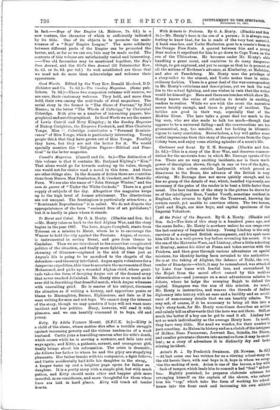At the Point of the Bayonet. By G. A. Henty.
(Blackie and Son. 6s.)—The date of this story is a hundred years ago, and the scene India ; Mr. Henty is nowhere unless he can range over the last century of Imperial history. Young Lindsay is the only survivor of a surprised British encampment, and his ayah rears him till he is a well-grown boy before revealing his secret. It is the era of the Mahratta Wars, and Lindsay, after a little schooling at Bombay, makes his debut at Poona and takes service with the Peishwa, and then goes through various adventures on special missions, his identity having been revealed to the authorities. He is at the taking of Alighur, the defence of Delhi, the sur. render of Bhurtpore—which, it may be remembered, was attacked by Lake tour times with fearful loss, and surrendered by the Rajah from the moral effect caused by this reckless determination—and journeys on a most adventurous mission to Johore, where he helps the usurping Rajah to defend the capital. Singapore was the aim of this mission. As usual, Mr. Henty is instructive, and weaves the threads of Indian diplomacy into history with an ease and a lucidity and an avoid- ance of unnecessary details that we can heartily admire. We may ask, of course, if it be necessary to bring all this into a boy's story-book, for Mr. Henty sometimes describes an action and calmly tell us afterwards that the hero was not there. Still, so much the better if a boy can be got to read it all. Lindsay has not so much individuality as the average Henty hero. In sooth, they have very little. Nor need we wonder, for their number is past counting. As Mehra: to history and as a sketch of the intrigues of Holkar, Nana Furnuwees, Jeswunt Rao, Scindia, the Nizaia, and smaller potentates thrown into narrative form it may be excel- lent ; as a story of adventure it is distinctly dry and lacks stirring incident.


























































 Previous page
Previous page